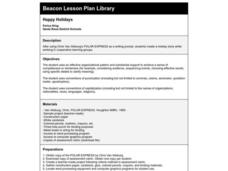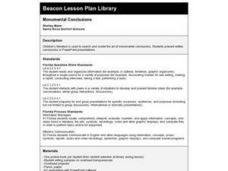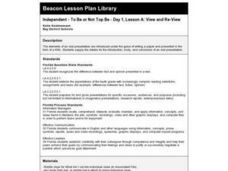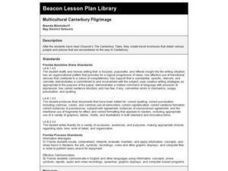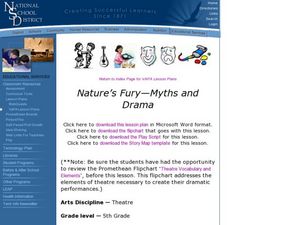Curated OER
The Life and Times of Gioacchino Rossini
Pupils discuss Gioacchino Rossini's life and musical culture. In this music lesson, students are introduced to "biofacts" about Rossini and listen to excerpts of his music. Pupils identify characteristics of Rossini's musical compositions.
Curated OER
Age of Exploration: A Comprehensive Research Project
Fifth graders examine reasons for exploration, the outcomes, and various explorers. In this age of exploration lesson, 5th graders create a flipbook with timeline and images to showcase their knowledge.
Curated OER
Review Steps in the Writing Process and Explore a Poem
Students practice their persuasive writing skills. For this writing process lesson, students write essays that meet the requirements of the included text element worksheets and analyze poetry of their choosing.
Curated OER
Top Secret Rule Reasons!
Students read the book The Secret Knowledge of Grown-Ups and write their own story based on a rule that grown-ups put upon kids. In this writing lesson plan, students focus on the trait of voice.
Curated OER
Population Pyramids
Young scholars explain the significance of population trends on world regions. They define relevant population vocabulary and examine age-gender patterns at various scales.
Curated OER
Asthma Survey
Learners collect survey data on the prevalence of asthma in a community. They summarize and display the survey data in ways that show meaning.
Curated OER
Happy Holidays
Students create holiday story while working in cooperative learning groups, using Chris Van Allsburg's Polar Express as a writing prompt.
Curated OER
Every Vote Counts
Students participate in an activity designed to increase student awareness and participation in the voting process.
Curated OER
African Art and Personal Adornment
Students explore the concept of personal adornment. They view and compile a list examples and compare personal adornment in American culture to that in African culture.
Curated OER
Water Conservation
First graders participate in a simulation in which they discover the community has been using too much water. In groups, they research the various ways the water is being used and create a home survey. They show the water usage of the...
Curated OER
Monumental Conclusions
Fourth graders create a PowerPoint presentation comparing a "Grabless Conclusion" to a "Monumental Conclusion", using picture books.
Curated OER
Research Question - Greenhouse Gas Emissions
Students review information from concept map to identify possible causes of greenhouse gas emissions, choose factor that they feel is largest contributor to greenhouse gas emissions in their town, and write research question on topic.
Curated OER
Independent - To Be or Not Top Be - Day 1, Lesson A: View and Re-View
Second graders explore the introduction, body, and conclusion of an oral presentation.
Curated OER
La Cenerentola (Cinderella)
Students are introduced to the composer, Gioacchino Rossini, and discuss his life and musical culture.
Curated OER
New War Against Whom?
Seventh graders write an essay on the Muslims involved with the terrorist attacks on the World Trade Center. They express how the attacks made them feel and what they can do to help.
Curated OER
Scavenger Hunt
Students research water quality issues and the impact on the environment using the Internet.
Curated OER
Multicultural Canterbury Pilgrimage
Pupils create travel brochures that detail various people and places that are encountered on the way to Chaucer's Canterbury.
Curated OER
The Captain And Lake Wilmar
Tenth graders examine the ecosystem of Lake Wilmar through three coordinated performance tasks. They first investigate the effects of pH on freshwater animals by comparing the zooplankton counts from three different areas. They then...
Curated OER
Organizing Ideas
Eighth graders investigate varous writing skills as part of larger course of study. The lesson is essentially a rough guide for conducting a class for writing. The main focus of the plan is organizing ideas using various strategies that...
Curated OER
Problem Solving: Steps and Strategies
Young scholars explore the concept of problem solving strategies. For this problem solving strategies lesson, students discuss methods for solving problems such as re-reading a problem, stating the facts, drawing a picture and so on....
Curated OER
Nature’s Fury—Myths and Drama
Fifth graders explore the elements of theatre. In this dramatic performances lesson, 5th graders discuss the structural elements of theatre and dramatize "The Origins of the Season," an explanation myth.
Curated OER
Be the Kiwi: New Zealand Introductory Activity
Students get a taste of New Zealand. In this global studies lesson, students view photographs from the country and discuss its geographic location and features. Students then participate in a scavenger hunt based on facts about the nation.
Curated OER
Pints and Quarts
For this measurement worksheet, students study the sets of pints or quarts for the 7 problems. Students circle the set of measurements that are less.
Curated OER
Media Center Map Skills
Student demonstrates the ability to locate, retrieve, and handle media and equipment by utilizing the library media center floor plan, symbols, and guides. They then use systems of classification to identify, locate, and retrieve materials.








